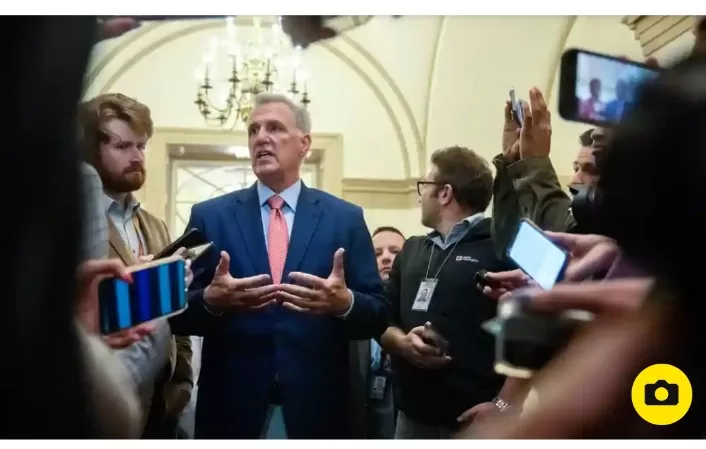WASHINGTON – In a stunning turn of events, the Republican-led US House of Representatives has vanished for an extended weekend recess, leaving critical matters unresolved. Speaker Kevin McCarthy’s failure to advance a temporary government spending bill has thrown the legislative body into turmoil, just days before a potential federal shutdown.
The White House, taking note of the mounting crisis, has begun instructing federal agencies to brace themselves for a potential shutdown, as reported by the Associated Press.
If Congress fails to pass a spending bill before the looming October 1st deadline, hundreds of thousands of federal employees face the grim prospect of working without pay, while essential government services could grind to a halt.
McCarthy, who had initially projected confidence at the start of Thursday’s session, now confronts the harsh reality of his precarious speakership. His second defeat this week came when a proposal to consider House Republicans’ defense spending bill was thwarted in a narrow vote of 216 to 212. Five hard-right members, including Dan Bishop of North Carolina and Marjorie Taylor Greene of Georgia, aligned with Democrats to oppose the motion.
This marked the second failure of the week for the defense spending bill, previously blocked by the House Freedom Caucus. It’s worth noting that this bill is typically one of the least contentious spending measures in the House, amplifying the gravity of this setback for budget negotiations.
McCarthy expressed frustration with his detractors within the Republican ranks, remarking, “I don’t understand why anybody votes against bringing the idea and having the debate. This is a whole new concept of individuals that just want to burn the whole place down. That doesn’t work.”
Former President Donald Trump, despite facing four criminal indictments, maintains a commanding lead as the frontrunner for the Republican presidential nomination in 2024. He has actively interfered, urging Republicans to leverage government funding as a means to oppose his prosecution, given that two of his cases are at the federal level.
In response to the escalating threat of a shutdown, the White House implored Republicans to “stop playing political games with people’s lives.” White House Press Secretary Karine Jean-Pierre stated, “Extreme House Republicans showed yet again that their chaos is marching us toward a reckless and damaging government shutdown.”
As the specter of a government shutdown looms, the White House’s directive to prepare for such an event is standard practice seven days before a potential federal disruption, however uncommon it may be. As of Friday, a clear path forward in the House remained elusive.
McCarthy has made multiple attempts to appease his hard-right faction by agreeing to steep spending cuts, but emboldened by Trump’s support, these conservatives have seized control of the situation dramatically.
Even a stopgap bill, referred to as a continuing resolution (CR), aimed at extending government funding beyond the September 30th deadline, faced resistance from the right flank.
House Minority Leader Hakeem Jeffries criticized House Republicans, stating that they remain beholden to the most extreme element of their caucus.
Should federal funding cease on October 1st, many government services would be disrupted, and hundreds of thousands of federal workers would be furloughed without pay. However, workers deemed “essential” would still be required to work, albeit without compensation.
Key government functions, such as the military, law enforcement agencies, and some critical services, would continue operating. Nevertheless, the broader implications of a government shutdown loom large, potentially affecting national parks, scientific research, and the functioning of regulatory bodies.
This unfolding crisis casts a shadow over the nation, and as the deadline draws nearer, the fate of the nation’s budget hangs in the balance.







